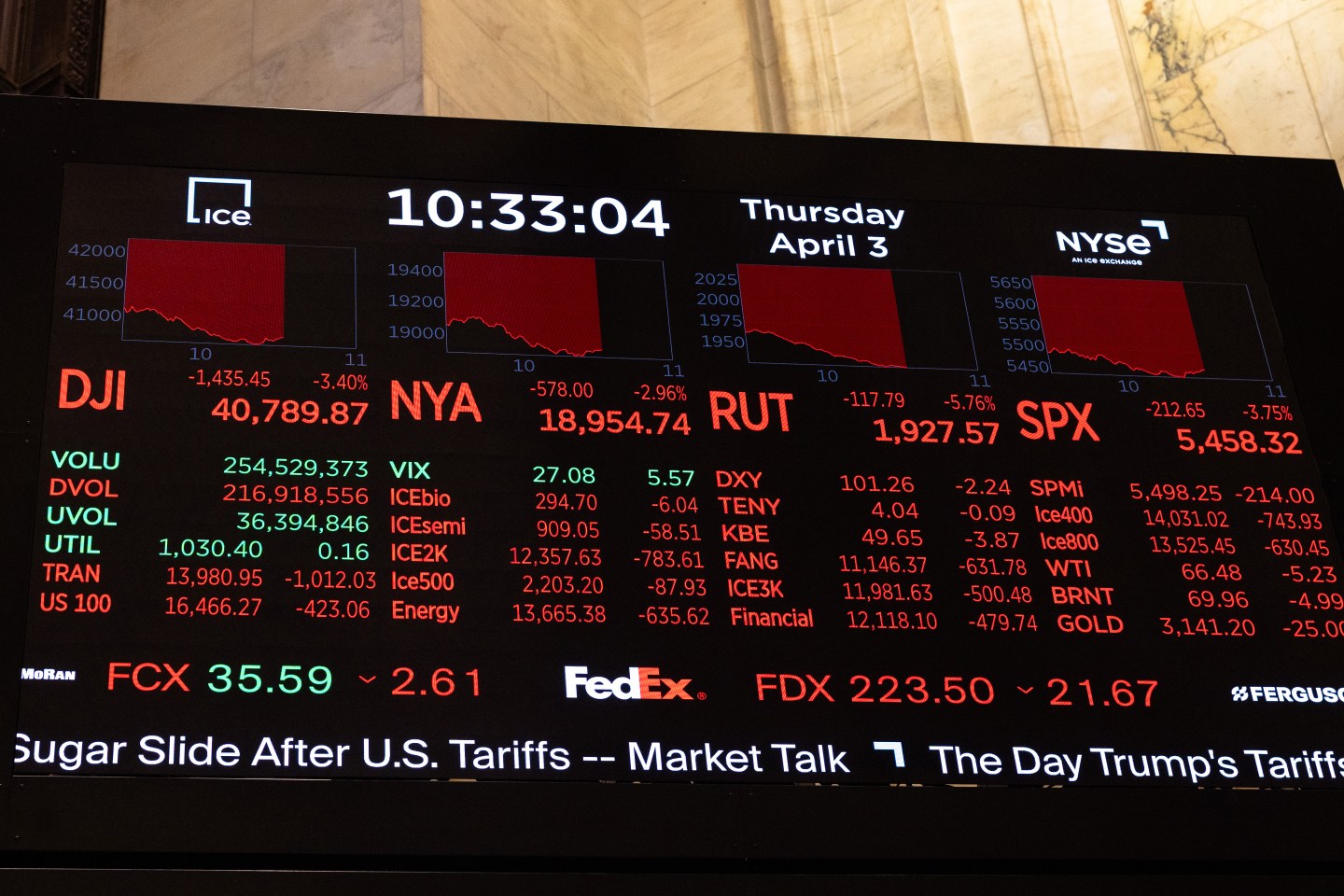Good morning. I’ve never been the type of person to say “TGIF,” but has there ever been more reason to than this week?
So: TGIF. Don’t look at your retirement accounts. HODL.
The news below. —Andrew Nusca
Want to send thoughts or suggestions to Fortune Tech? Drop a line here.
Tech stocks plummet in worst market slide since 2020

Global markets plunged further on Thursday as sweeping U.S. import tariffs—10% on everyone; more on most everyone—sunk in.
The Dow dropped by more than 1,600 points. The S&P 500 fell by almost 5%. The tech-heavy Nasdaq, which includes Amazon, Apple, and Nvidia? Six percent.
Of the so-called Magnificent 7 tech stocks, Apple—which manufactures its iPhones in China, India, and elsewhere in the region—experienced the worst drop, at 9%. Amazon (dependent on Chinese goods) and Meta weren’t far behind, also at 9%. Nvidia, whose chips are made in Taiwan and systems are assembled in Mexico, dropped 8%. Alphabet fell 4%. Microsoft fell 2%.
The pain wasn’t limited to the biggest of Big Tech, either. Dell dropped 19%. HP and Micron fell 16%. Broadcom and Marvell each slumped by 10%. AMD slid 9%.
In all, stocks lost about $3.1 trillion in market value, the worst decline since March 2020. JPMorgan analysts raised their recession likelihood estimate to 60%.
And it isn’t over. In the wake of the markets destruction, President Trump promised tariffs for semiconductors “very soon” with those for pharmaceuticals to follow. (He previously warned of a 25% or higher chip tariff.) Both categories were exempted from the “reciprocal” import tariffs, including the 32% one for Taiwan, announced late Wednesday.
Not every American tech company is reeling, though. Right after the U.S. tariffs were announced, defense tech purveyor Palantir was happy to note in a blog post “how enterprises can harness Palantir to address the tariffs challenge.”
Don’t knock the hustle, I guess. —AN
Intel, TSMC will form a joint venture
Intel and TSMC have reportedly reached an agreement were reportedly in talks to form a joint venture to operate Intel’s chip manufacturing business.
TSMC—the world’s largest contract chip manufacturer—would take a 20% stake in the new organization, according to The Information. Intel and other unspecified investors would own the rest.
Shares of Intel were up about 3% to $22.43 on the news, though they’re still down by 44% from their price one year ago.
Intel’s chipmaking business, a.k.a. its foundry, has struggled in recent years. Huge capital investments led the business to bleed cash—it lost $13.4 billion in 2024—and efforts to right the ship won’t pay off for years. (Intel believes its foundry will break even in 2027.)
Intel’s foundry once only served its parent company; under former CEO Pat Gelsinger, it evolved into a third-party manufacturer like TSMC, which serves Apple, Nvidia, AMD, and other leading tech companies. Both companies have made big bets in the U.S. and are recipients of CHIPS Act grants.
Intel has said that Amazon and Microsoft will continue to use it to make their own custom chips.
"As we strengthen our Intel products,” CEO Lip-Bu Tan said at the company’s customer conference earlier this year, “[we] are equally committed to building a great foundry.” —AN
Note: We updated this item after changes were made to the report it cites.
EU readies a massive X fine
European Union regulators are reportedly preparing major penalties for Elon Musk’s social media platform, X.
The allegation? That X violated the Digital Services Act, which aims to combat disinformation and force social media companies to take responsibility for the content on their platforms.
The New York Times notes that the penalties will include a fine that “could surpass $1 billion” as well as product changes. Both will be announced this summer.
A variable: How large the fine will be, and how much that will antagonize U.S. President Donald Trump, who is close to Musk and has objected to overseas regulation of U.S. technology companies.
But regulators “seek to make an example of X to deter other companies from violating the law,” per the Times, in part because the penalties would be the first issued under the new law.
Caveat: The EU and X could still reach a settlement if the company makes changes that satisfy regulators.
In the meantime, X remains embroiled in another EU investigation over its alleged hosting of hate speech and other illegal content. X has publicly objected to such moves as an “attack on free speech.” Freedom of expression is a protected right in the EU charter. —AN
More tech
—Ireland will fine TikTok. A reported €500M+ fine for illegally sending user data to China.
—More detail on Microsoft’s abandoned datacenters. Halts or pauses for facilities in Australia, Indonesia, United Kingdom, plus Illinois, North Dakota, and Wisconsin.
—NSA director sent packing. Cyber Command chief Timothy Haugh has been fired along with deputy Wendy Noble.
—Free ChatGPT Plus. OpenAI offers to college students in the U.S. and Canada in a bid to outmaneuver rival Anthropic.
—Pinduoduo to spend $13 billion. Three years of investment by the Temu owner to support merchants following profit squeeze criticism, trade war pain.
—Another Oracle hack. Old login credentials led to stolen passkeys and an extortion attempt.
—Brazil investigates Apple over App Transparency Tracking feature following a Meta complaint.
—Will AI ever cure cancer? Fortune looks at the multibillion-dollar race to bring the first AI-discovered drug to market.

